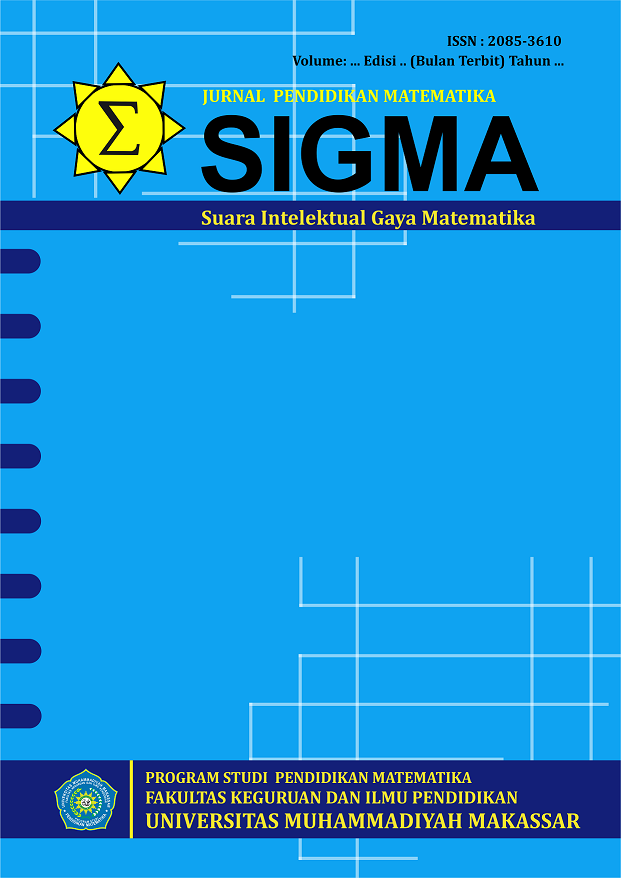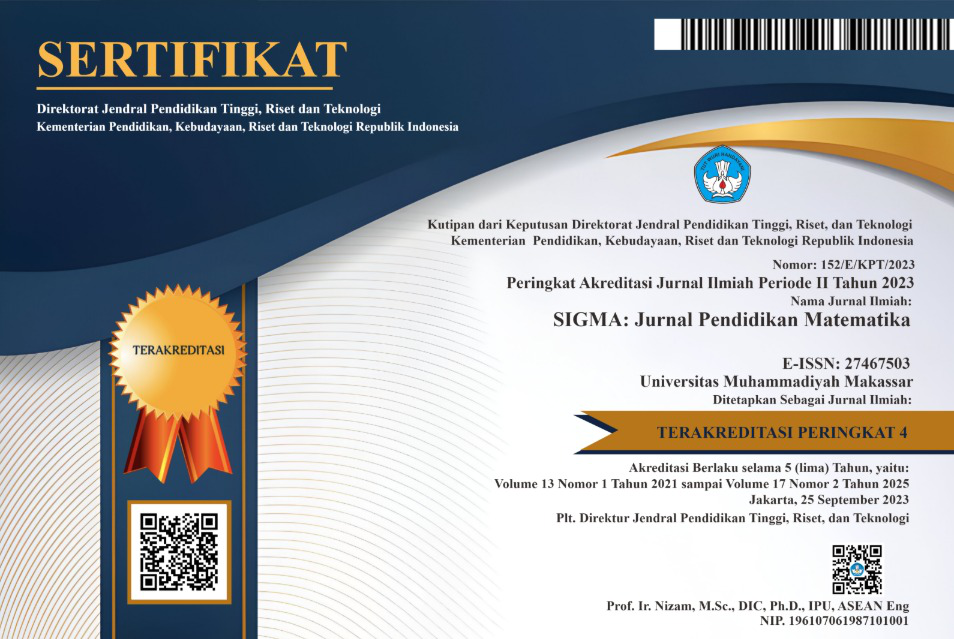IDENTITAS MATEMATIS: STUDI KASUS PADA MAHASISWA AKUNTANSI
DOI:
https://doi.org/10.26618/sigma.v15i1.10928Keywords:
identitas, matematis, mahasiswa akuntansiAbstract
Identitas matematis merupakan salah satu aspek yang penting untuk dimiliki mahasiswa, baik itu mahasiswa di jurusan matematika maupun yang non-matematika. Penelitian ini merupakan penelitian kualitatif yang bertujuan untuk mendeskripsikan identitas matematis yang dimiliki mahasiswa akuntansi. 59 mahasiswa terlibat sebagai partisipan dalam survei yang dilakukan untuk kategorisasi identitas matematis. Peneliti kemudian melakukan wawancara dengan dosen terkait 1 mahasiswa dengan identitas matematis positif dan 1 mahasiswa dengan identitas matematis negatif. Teknik analisis data yang digunakan menggunakan tiga tahapan utama yaitu kondensasi data, tampilan data, dan pengambilan kesimpulan. Hasil penelitian kami menunjukkan bahwa mahasiswa dengan identitas matematis positif dan negatif memiliki perbedaan yang cukup signifikan. Perbedaan tersebut mulai pengetahuan, kemampuan, serta minat dan motivasi. Mahasiswa dengan identitas matematis positif memiliki prestasi matematika yang lebih tinggi dibandingkan mahasiswa dengan identitas negatif. Hal ini ditandai dengan frekuensi menjawab pertanyaan atau soal, nilai, dan tingkat kesulitan soal yang dapat dijawab. Selain itu, mahasiswa dengan identitas matematis positif lebih antusias dan termotivasi dalam mengikuti pembelajaran matematika dibandingkan mahasiswa dengan identitas matematis negatif yang sekadar hanya ingin menggugurkan kewajiban untuk mengikuti perkuliahan. Mahasiswa dengan identitas matematis positif cenderung lebih berinisatif dan mandiri.
References
Allen, K., & Schnell, K. (2016). Developing Mathematics Identity. Mathematics Teaching in the Middle School, 21(7), 398. https://doi.org/10.5951/mathteacmiddscho.21.7.0398
Anderson, R. (2007). Being a Mathematics Learner: Four Faces of Identity. The Mathematics Educator, 17(1), 7–14.
Arikunto, S. (2012). Dasar-Dasar Evaluasi Pendidikan (2nd ed.). Bumi Aksara.
Axelsson, G. B. M. (2009). Mathematical identity in women: The concept, its components and relationship to educative ability, achievement and family support. International Journal of Lifelong Education, 28(3), 383–406. https://doi.org/10.1080/02601370902799218
Bishop, J. P. (2012). “She’s Always Been the Smart One. I’ve Always Been the Dumb One”: Identities in the Mathematics Classroom. Journal for Research in Mathematics Education, 43(1), 34. https://doi.org/10.5951/jresematheduc.43.1.0034
Boaler, J. (2002). Exploring the Nature of Mathematical Activity: Using Theory, Research and “Working Hypotheses” to Broaden Conceptions of Mathematics Knowing. Educational Studies in Mathematics, 51(1/2), 3–21. https://doi.org/10.1023/A:1022468022549
Darragh, L. (2016). Identity research in mathematics education. Educational Studies in Mathematics, 93(1), 19–33. https://doi.org/10.1007/s10649-016-9696-5
George, P. (2009). Identity in Mathematics: Perspectives on Identity, Relationships, and Participation. In Mathematical Relationships in Education: Identities and Participation (pp. 201–2012). Routledge.
Grootenboer, P., & Edwards-Groves, C. (2019). Learning mathematics as being stirred into mathematical practices: An alternative perspective on identity formation. ZDM, 51(3), 433–444. https://doi.org/10.1007/s11858-018-01017-5
Grootenboer, P., & Zevenbergen, R. (2008). Identity as a Lens to Understand Learning Mathematics: Developing a Model. Proceedings of the 31st Annual Conference of the Mathematics Education Research Group of Australasia, 243–250.
Hima, L. R., Nusantara, T., Hidayanto, E., & Rahardjo, S. (2019). Changing in Mathematical Identity of Elementary School Students Through Group Learning Activities. Lnternational Electronic Journal of Elementary Education, 11(5), 461–469. https://doi.org/10.26822/iejee.2019553342
Kaasila, R. (2007). Mathematical biography and key rhetoric. Educational Studies in Mathematics, 66(3), 373–384. https://doi.org/10.1007/s10649-007-9085-1
Kaspersen, E., Pepin, B., & Sikko, S. A. (2017). Measuring STEM students’ mathematical identities. Educational Studies in Mathematics, 95(2), 163–179. https://doi.org/10.1007/s10649-016-9742-3.
Kilasi, D. V. 2016. Characteristics and Development of Students’ Mathematical Identities: The Case of a Tanzanian Classroom. Disertassi tidak diterbitkan. Helsinki: University of Helsinki.
Mann, P. S., & Lacke, C. J. 2010. Introductory statistics. Hoboken, NJ: J. Wiley & Sons
McGee, E. O. (2015). Robust and Fragile Mathematical Identities: A Framework for Exploring Racialized Experiences and High Achievement Among Black College Students. Journal for Research in Mathematics Education, 46(5), 599. https://doi.org/10.5951/jresematheduc.46.5.0599
Miles, M. B., Huberman, A. M., & Saldaña, J. 2014. Qualitative data analysis: A Methods Sourcebook, Edisi 4. Los Angeles: SAGE Publications, Inc.
Mkhize, D. R. (2017). Forming Positive Identities to Enhance Mathematics Learning among Adolescents. Universal Journal of Educational Research, 5(2), 175–180. https://doi.org/10.13189/ujer.2017.050201
Radovic, D., Black, L., Salas, C, E., & Williams, J. (2017). Being a Girl Mathematician: Diversity of Positive Mathematical Identities in a Secondary Classroom. Journal for Research in Mathematics Education, 48(4), 434. https://doi.org/10.5951/jresematheduc.48.4.0434
Sfard, A. (n.d.). Disabling Numbers: On the Secret Charm of Numberese and Why It Should Be Resisted. In Mathematical Relationships in Education: Identities and Participation (pp. 9–18). Routledge.
Sfard, A., & Prusak, A. (2005). Telling Identities: In Search of an Analytic Tool for Investigating Learning as a Culturally Shaped Activity. Educational Researcher, 34(4), 14–22. https://doi.org/10.3102/0013189X034004014
Solomon, Y. (2009). Mathematical literacy: Developing identities of inclusion. Routledge.
Downloads
Additional Files
Published
Issue
Section
License
With the receipt of the article by the SIGMA: Jurnal Pendidikan Matematika Editorial Board and the decision to be published, then the copyright regarding the article will be diverted to SIGMA: Jurnal Pendidikan Matematika.
Universitas Muhammadiyah Makassar as the publisher of SIGMA: Jurnal Pendidikan Matematika hold the copyright regarding all the published articles in this journal.Universitas Muhammadiyah Makassar has the right to multiply and distribute the article and every author is not allowed to publish the same article that was published in this journal.
The manuscript authentic and copyright statement submission can be downloaded ON THIS FORM.






